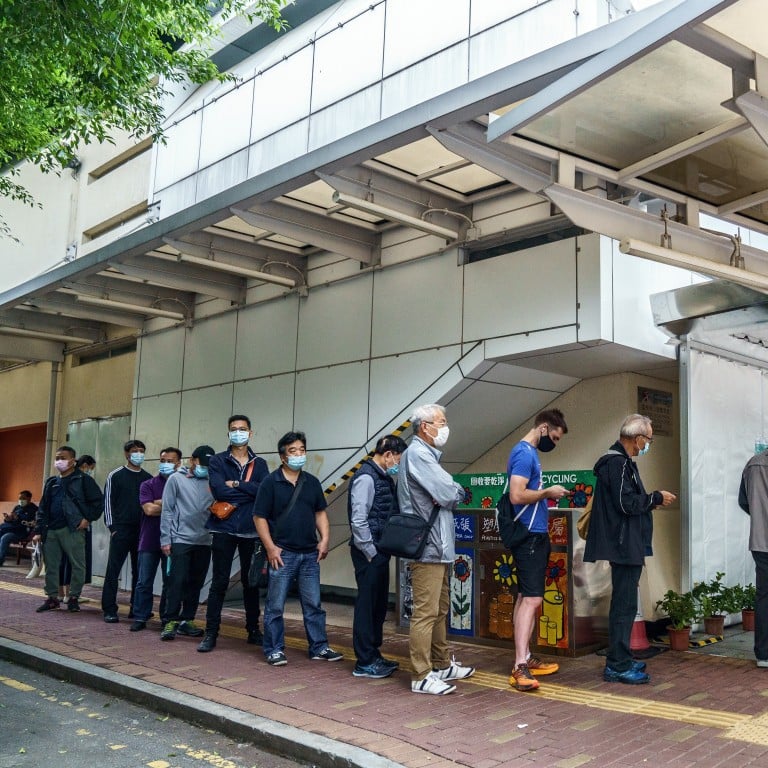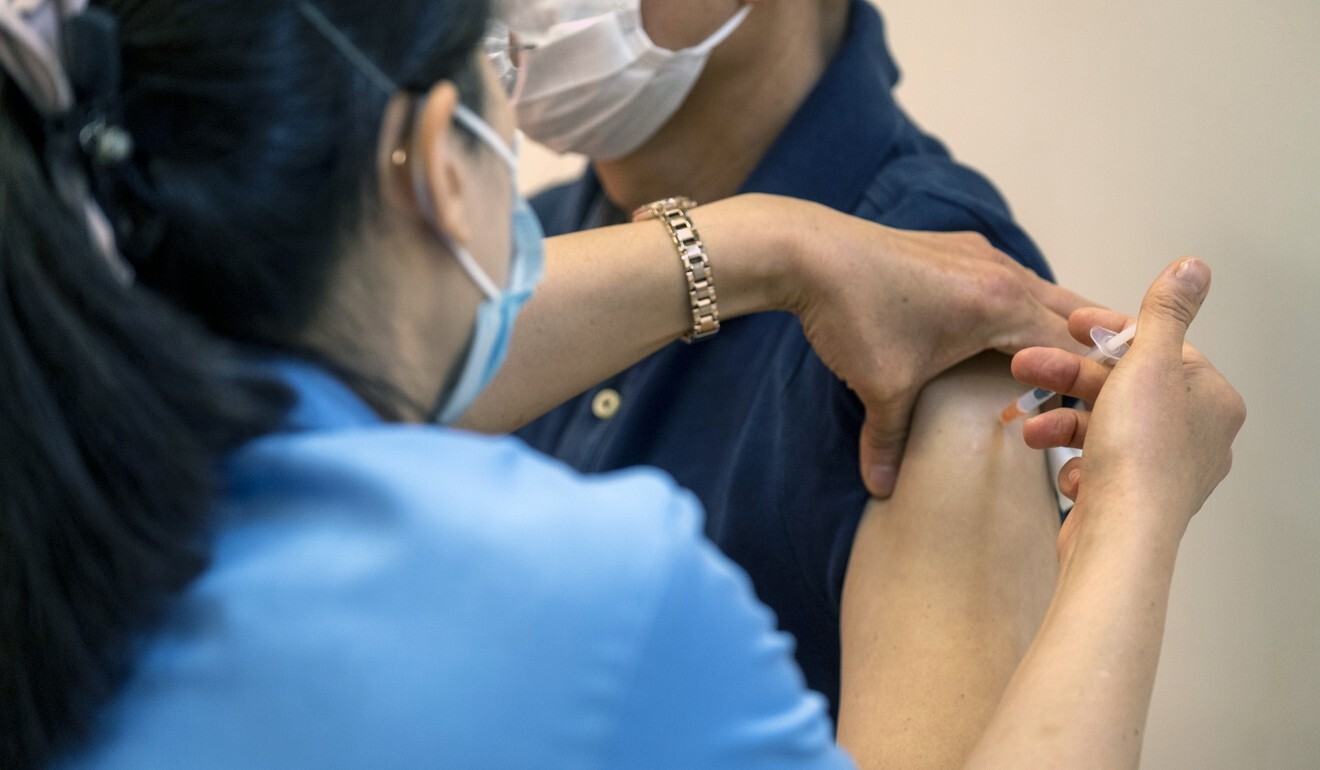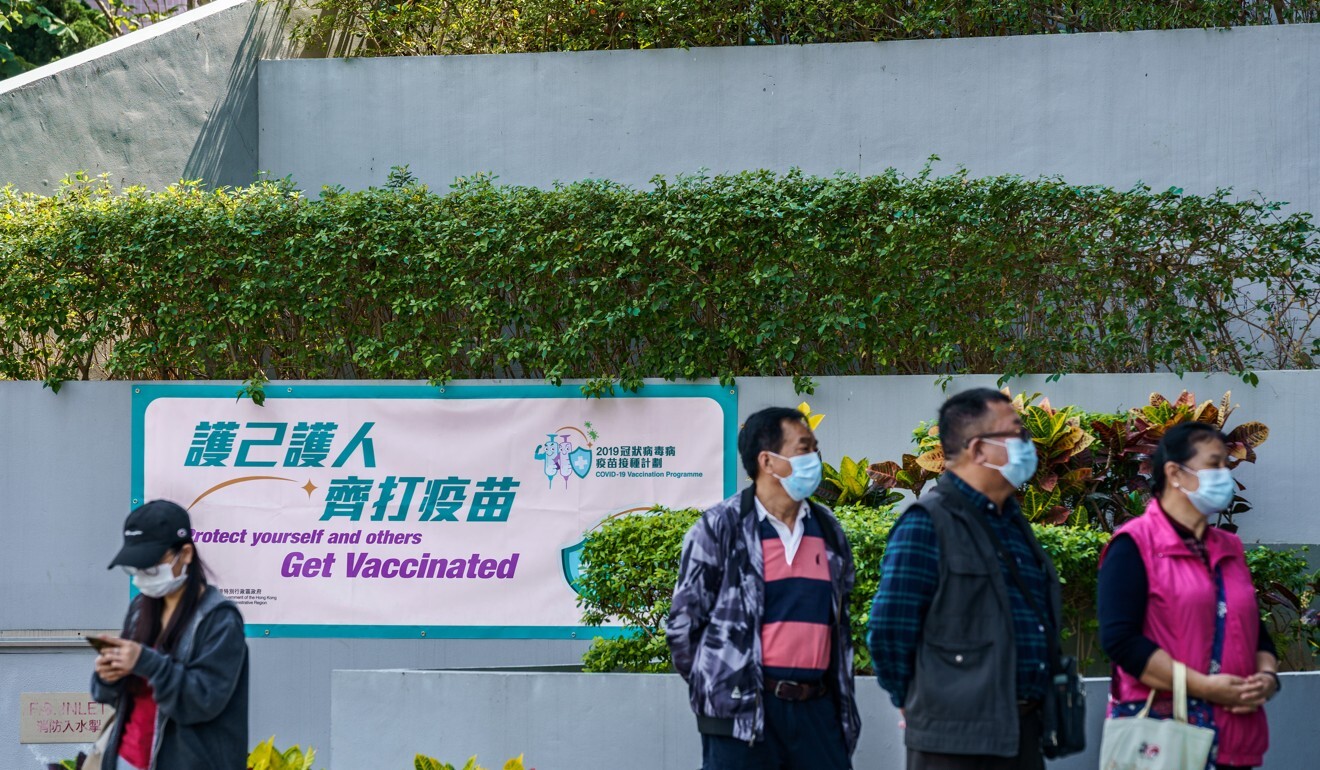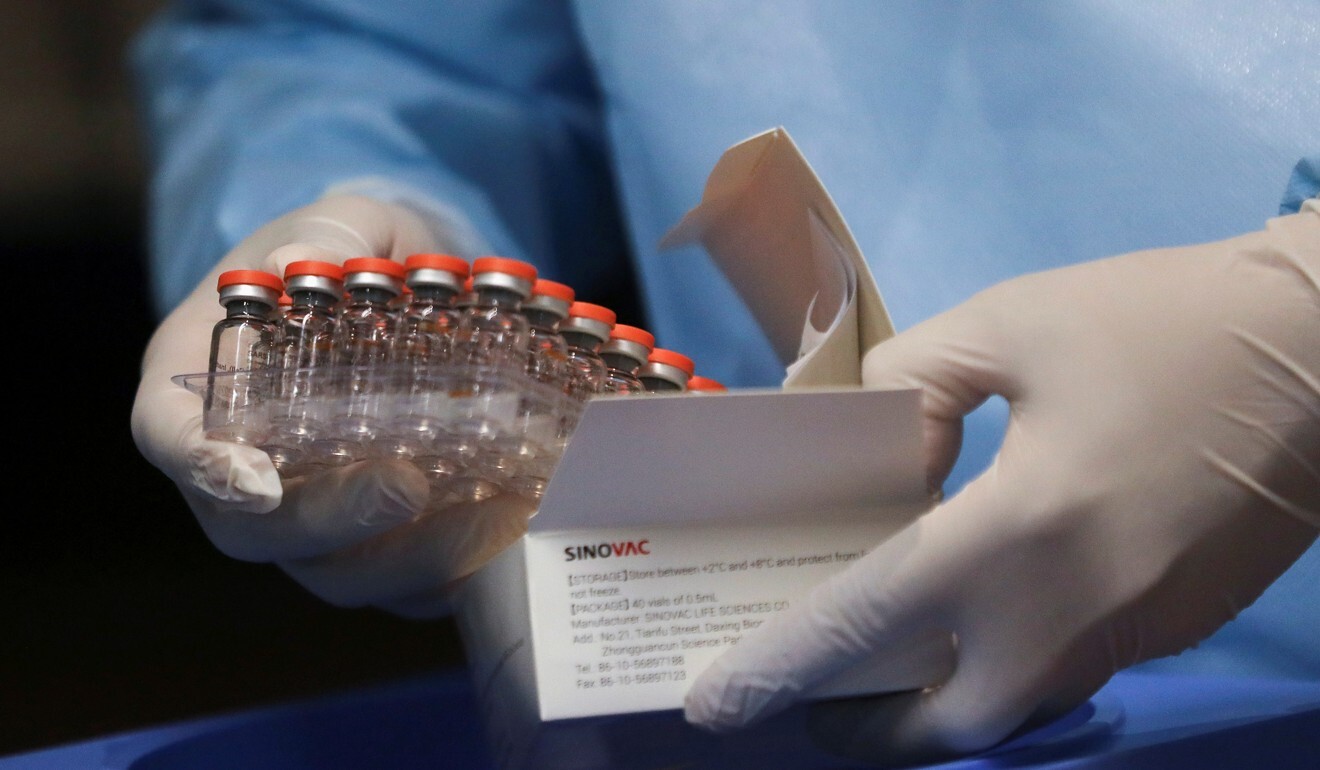
Explainer | Why has Hong Kong’s coronavirus vaccination drive stumbled recently, and should you be worried about possible side effects?
- With no-shows for injections on the rise, the Post looks at the known risks as well as the guidelines for who should and shouldn’t be signing up for a jab
- Doctor and patient groups have come together to ask the government to provide greater guidance and protections for at-risk groups
The minister handling the mass inoculation programme, civil service chief Patrick Nip Tak-kuen, has conceded that bookings have dipped because of public concerns over people seeking hospital treatment after being vaccinated.
About 72 per cent of people who booked a Sinovac injection on Wednesday turned up for their appointment, compared with 64 per cent on Tuesday and 90 per cent at the scheme’s launch last month. The take-up rate for the BioNTech vaccine, meanwhile, was 91 per cent, with 5,900 people receiving the shot on its first day of availability.
While government officials, including Chief Executive Carrie Lam Cheng Yuet-ngor, continue to urge residents to stick with the programme, pressure is mounting from doctor and patient groups demanding clearer guidelines on who should take the jab, and greater protection for those prone to vaccine side effects.
For residents unsure if they should be vaccinated, here is the latest advice from the government and local health experts.
Should we be concerned about the side effects after injection?
Local experts say no. They believe there is no evidence from clinical trials to show the vaccines, including Sinovac’s, will lead to heart attacks, strokes or other reactions likely to cause death. Three people died in the days following their Sinovac jabs, with dozens of others suffering symptoms such as dizziness, palpitations and headaches.
An expert committee earlier found no direct links between the vaccine and the death of the first two people, both of whom had chronic illnesses. The panel will assess a detailed autopsy report before deciding whether the third death – that of a 71-year-old patient without any record of chronic illness – was linked to the shot.
University of Hong Kong (HKU) microbiologist Dr Ho Pak-leung and respiratory medicine specialist Dr Leung Chi-chiu both said they believed the incidents were not alarming.
“With reference to current data, I do not think there is a danger signal,” Ho said.
Leung said the risk of adverse effects was not from the vaccine itself, but rather the patient’s underlying health conditions.

“If you get routine check-ups and there are no significant changes to your body or lifestyle, then there should not be any problems,” Leung said.
A certain number of adverse reactions are to be expected, according to Dr Lam Ching-choi, an Executive Council member who sits on a task force overseeing vaccine distribution.
The number of reported cases of abnormalities after taking the vaccine was expected to be similar to other countries such as Norway, he said.
“As more people get vaccinated, it is expected that more cases of abnormalities will occur, but our monitoring system in Hong Kong will be able to track all those who die or are hospitalised,” Lam said.
On Wednesday, Secretary for Innovation and Technology Alfred Sit Wing-hang continued to urge people to take the vaccine, saying the overall benefits vastly outweighed the drawbacks.
“There may be side effects for a very small proportion of people,” he said. “But when compared to the impact of the pandemic, which has affected our lives for months and resulted in the fatigue of many people, and given the coronavirus’ high transmission rate, taking the jab can protect us and our friends and families.”
Then why is there a drop in the uptake rate?
The government should have done a better job of explaining the range of possible reactions to getting a shot, HKU’s Leung said, explaining that people were understandably nervous because they were unprepared for the realities.
“Our reporting system was more extensive than that of many other places, that’s why the misunderstanding was created,” Leung said.
“They are scared by the numbers reported each day, which leads to a misconception that the vaccine is dangerous. That’s why people have been hesitant to book slots lately.”
He said many places reported only major incidents, while Hong Kong had included all adverse events without revealing the context or explaining the normal incidence rates of various conditions, making it appear the city had a high number of cases.
The authorities should have explained why there was a need to monitor the data and what kinds of symptoms were likely to show up, he added.
About 10,900 people received Sinovac shots on Wednesday, while some 130,500 have so far received either that vaccine or the BioNTech version since the inoculation drive began, according to the most recent government data.
Hong Kong on Wednesday officially began offering the jabs developed by German firm BioNTech and American pharmaceutical giant Pfizer, with some high-priority residents given early access.
Those inoculations are being given at vaccination centres in Sai Ying Pun, Sai Wan Ho, Kowloon Tong, Kwun Tong, Lai Chi Kok, Sheung Shui and Yuen Long.
On the first day, some centres such as Sai Ying Pun’s Sun Yat Sen Memorial Park Sports Centre were fully booked, with residents telling the Post they had more confidence in the Pfizer-BioNTech vaccine than the Sinovac one.

Who should think twice before getting jabbed?
In general, Hong Kong’s official guidelines say individuals with a history of severe hypersensitivity to a previous dose of the same Covid-19 vaccine should not receive the vaccination. Those with a history of severe hypersensitivity to polyethylene glycol (PEG) or polysorbate should not receive the BioNTech vaccine. Vaccinations should also be avoided by anyone with a fever.
Pregnant women should not receive the Sinovac vaccine, according to the guidelines, and they are also advised not to take the BioNTech jabs unless they are considered at very high risk of coronavirus exposure and complications.
If a woman finds out she is pregnant after being vaccinated, termination of pregnancy is not recommended, though she should wait to take her second dose until after giving birth.
As for whether the frail and elderly should be vaccinated, there are conflicting views.
Local and overseas experts have pointed out that there was not yet enough data to prove the Sinovac vaccine was effective for those aged 60 and above.
Hong Kong doctors, patients groups push for better guidance on vaccine side effects
HKU professor Ho said Sinovac had made it clear there was insufficient data for those older than 60 because not enough people in that age group took part in the first- and second-phase clinical studies. Only 385 domestic and 316 overseas participants were 60 years old or over.
Phase-three clinical trials in Brazil, the results of which have not been published in a scientific journal, included just 186 and 176 people over the age of 60 in the two groups involved.
“To deal with the effectiveness and safety of Sinovac for people over 60 years old, it is believed we have to wait for data from real-world use,” Ho said.
Local authorities, however, say the benefits of reducing the risk of a severe case of Covid-19 outweighs that of receiving the vaccine for most elderly people.
The current guidelines conclude there is no evidence to suggest an unexpected increase in mortality for the elderly following the use of the BioNTech vaccine, a finding in line with available information and recommendations from overseas authorities and the World Health Organization.
While there is also limited efficacy data for adults aged 60 or above so far, there is clinical data indicating BioNTech vaccinations will induce formation of neutralising antibodies in that age group, according to the official guidelines.
Lam, the executive councillor, advised the elderly in particular to consider taking the jab at private clinics with the advice of doctors. Leung, the respiratory medicine specialist, said it was relatively safe for those without underlying health conditions.

So, who should be vaccinated?
The BioNTech shot is indicated for use in individuals aged 16 years or older, while the Sinovac vaccine is recommended for those aged 18 years or above, according to the government’s guidelines.
Initially, residents aged 60 or above were prioritised in the vaccination campaign. Others, including health care workers, residents and staff of care homes, public service employees and cross-boundary transport workers, were also among those allowed to get jabs first.
From Tuesday, the programme was expanded to include additional sectors, including those who work at restaurants and supermarkets, bringing the number of residents eligible to 3.7 million.
The new sectors are catering, construction, education, tourism, public transport, property management and businesses heavily affected by social-distancing restrictions, such as gyms and beauty parlours.
In the long run, the government has said all of Hong Kong’s population will be vaccinated in a phased approach.
Who should we ask if we are unsure?
Consult your family doctor. At least that is what the officials have repeatedly advised, though not every doctor will offer the same advice.
District councillor Ramon Yuen Hoi-man said one 76-year-old constituent, who had heart disease and suffered a stroke in 2014, was very confused about contradictory advice given by public hospitals and his private doctors.
After a doctor at Caritas Hospital suggested he get the jab, and his family physician advised against it, the man sought help from Yuen.
“As I am not a doctor myself, I could only advise him to consult the doctors again,” said Yuen, from the Democratic Party, who has set up a hotline for residents to get information about the vaccination programme.
Yuen criticised the government for asking the public to assume responsibility for their decision to be vaccinated or not.
Vaccination drive: ‘get a jab, receive a reward’, bosses of some priority sectors say
Alex Lam, chairman of Hong Kong Patients’ Voices, said: “Although citizens do have a responsibility to monitor their own health situation, the government should be taking more responsibility as a gatekeeper and be able to immediately confirm their … medical history [through electronic records].”
Doctors have complained that a lack of clear guidelines has led to confusion and a wariness about offering advice.
Dr Gabriel Choi Kin, president of the Hong Kong Medical Association, said some private doctors were worried about suggesting their patients take the vaccine.
“Some doctors are concerned, and more are advising [patients] against taking the vaccine, which could result in fewer people getting the jab, meaning herd immunity might not be achieved,” Choi told a local radio programme.
Two bodies, the medical association and Hong Kong Doctors Union, both urged the government to provide guidelines that clearly underline which groups of people were not suitable for vaccination.
But not everyone has a private doctor. Should the government do more?
Medical practitioners should be on duty at community centres to do health assessments determining if residents are fit to receive the jabs, lawmaker Ann Chiang Lai-wan has suggested.
Chiang, a member of the Legislative Council’s health services panel, said the Food and Health Bureau should start a hotline for residents who had queries about the vaccines, as some people may not have a personal doctor.
Medical staff should be present at vaccination centres to do the “gatekeeping” work of screening out patients not suitable for vaccination, agreed Lam of the patients’ group.
He also urged the government to do more to address the public’s concerns, including creating a better system of monitoring the condition of those who take the jab.
Can we skip certain precautionary measures after getting jabbed?
No, all coronavirus regulations still apply for those who have been vaccinated, including wearing a mask in outdoor areas, and observing all other social-distancing measures.
This differs from some other countries, including the United States, where governments are trying to give their vaccination programmes a push by granting additional freedoms for those who join.
Additional reporting by Gigi Choy

